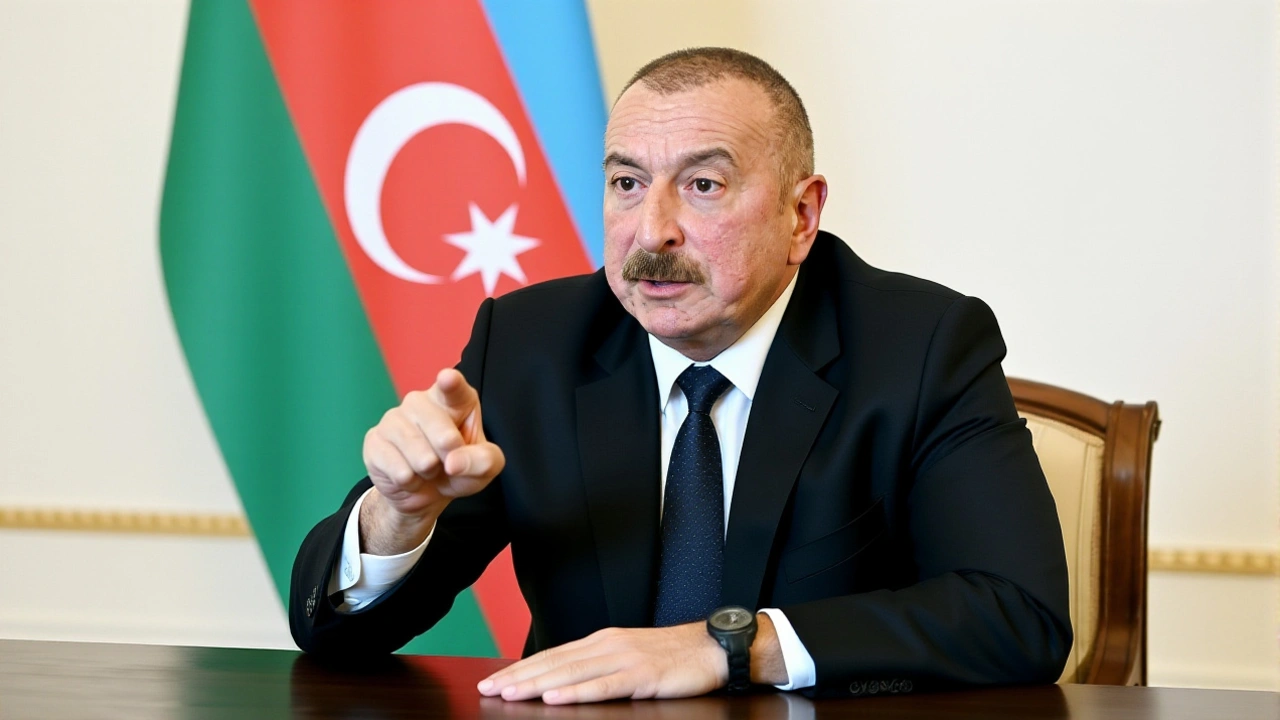Azerbaijan Mulls Lifting Arms Embargo on Ukraine After Russian Strikes on SOCAR Assets

When Ilham Aliyev, President of Azerbaijan, spoke on the phone with Volodymyr Zelenskyy, President of Ukraine, on August 10, 2025, both leaders condemned what they called "targeted Russian airstrikes" on Azerbaijani energy facilities inside Ukraine. The strikes hit assets belonging to the State Oil Company of Azerbaijan Republic (SOCAR) in the Odessa region, prompting Baku to hint that it might lift its long‑standing arms embargo on Kyiv if Moscow continues its "aggressive policy".
Background: Energy Ties That Bind
The partnership between Azerbaijan and Ukraine is only a few months old but already strategic. In July 2025, Naftogaz of Ukraine signed a gas‑supply pact with SOCAR, routing Azerbaijani gas through the newly inaugurated Trans‑Balkan Gas Pipeline. The line began operations on June 28, 2025, delivering an initial 3 billion cubic metres per year – modest in volume but politically potent, signaling Kyiv’s desire to diversify away from Russian pipelines.
Historically, Baku kept a careful distance from the Ukraine war, focusing on its own neighbourhood conflicts. The September 2023 flash operation that reclaimed Karabakh from Armenia, followed by a 2020 flare‑up and the eventual Russian peace‑keeper withdrawal, gave Azerbaijan confidence to push a more independent foreign policy, often leaning on Turkey and Israel for support.
The August Attacks: Two Days, Two Blow‑outs
On the night of August 6‑7, Russian forces unleashed a swarm of drones on the Orlovka compressor station in the village of Novoselske, Odesa Oblast. The site, a key hub that pushes Azerbaijani gas through the Trans‑Balkan route, was pelted by "dozens of drones" according to Ukraine’s Ministry of Energy. While the compressors survived, the attack was undeniably a message: Moscow could disrupt the new energy link at any moment.
Just hours later, on August 7‑8, five Shahed‑type kamikaze drones slammed into SOCAR’s oil depot in the same oblast. The strike ignited a blaze, ruptured a diesel pipeline and left four SOCAR employees with serious injuries. The depot, built in 2024, was one of the few Azerbaijani‑owned facilities on Ukrainian soil.
Ukrainian officials described the Orlovka attack as an attempt to "damage Kyiv's trade relations with Baku and other partners," suggesting the strikes were meant to pressure both Baku and Kyiv simultaneously.
Diplomatic Reactions: From Phone Calls to Public Warnings
Following the attacks, Aliyev and Zelenskyy exchanged a terse conversation that was later summarized by the Azerbaijani state news agency Caliber.Az. The agency, citing "reliable sources," reported that Baku was now weighing the possibility of lifting its arms embargo and sending weapons to Kyiv – a stark reversal of policy that has been in place since the early 1990s.
Russia did not sit idle. On August 11, Aleksei Fadeev, a spokesman for the Russian Foreign Ministry, warned Baku that any move to arm Ukraine would "only worsen the situation" and reiterated Moscow’s claim that Kyiv is a "neo‑Nazi regime." The warning came during a TASS‑broadcast briefing and was aimed squarely at deterring Baku from taking the next step.
Why Baku Might Flip the Switch
The calculus for Azerbaijan is shifting. CEPA analysts note that the successful 2023 peace deal with Armenia, bolstered by Turkish backing, has emboldened Baku to act more assertively. Moreover, the energy agreement with Ukraine offers a new lever – if Russian strikes continue, Baku could retaliate not just with diplomatic protests but with tangible military aid.
In a late‑August interview with Al Arabiya, Aliyev described the 1920 Soviet takeover of Azerbaijan as an "occupation" – a rare public rebuke of Russia that underscores the depth of Ankara’s and Tel Aviv’s influence on Baku’s foreign policy. The president also said in Kelbajar on August 21 that "Azerbaijan must always be ready for war," showcasing newly acquired special‑forces units, upgraded aircraft and fresh fighter‑jet contracts.
Regional Ripples: South Caucasus at a Crossroads
If Azerbaijan does lift the embargo, the move could reshape the security architecture of the South Caucasus. Turkey, a longtime ally of both Kyiv and Baku, would likely welcome more weapons flowing eastward, while Israel, which has supplied drones to Azerbaijan in the past, could see new opportunities for arms sales.
For Russia, the stakes are equally high. The Kremlin’s influence in the Caucasus has already been eroded by the Ukraine war and the 2023 US‑backed Azerbaijan‑Armenia peace deal. A Baku‑Ukraine arms corridor would further marginalize Moscow, potentially encouraging other former Soviet states to reconsider their own security postures.
What Comes Next?
Analysts say the next few weeks are critical. Kyiv will likely press Baku for concrete commitments, while Moscow may increase the frequency of attacks on Azerbaijani assets in Ukraine to test the limits of Baku’s resolve. Meanwhile, the United States and European Union are watching closely, ready to adjust sanctions or security aid depending on how the triangle evolves.
For now, Azerbaijan’s official stance remains ambiguous – a diplomatic tightrope that balances economic interests, regional alliances and the ever‑present risk of escalation.
Frequently Asked Questions
How could lifting the arms embargo affect the Ukraine war?
Should Baku supply weapons, Kyiv would gain a new source of modern equipment, potentially strengthening its front lines in the east. It could also force Russia to divert resources to protect its own interests in the Caucasus, thereby stretching its military thin.
What sparked the recent Russian attacks on SOCAR facilities?
Ukraine’s July 2025 gas‑supply deal with SOCAR made Azerbaijani infrastructure a strategic target. Russian officials framed the strikes as retaliation for "aggressive" Azerbaijani actions, though they also serve to intimidate Kyiv’s new energy partners.
Which countries are likely to support Azerbaijan if it arms Ukraine?
Turkey and Israel have historically backed Azerbaijan’s defence industry and could facilitate weapons transfers. The United States, watching the South Caucasus closely, may also lend diplomatic cover, though it has not pledged direct support.
What does this latest tension mean for Russia's influence in the region?
Each Azerbaijani‑Ukraine cooperation step chips away at Moscow’s foothold. Continued Russian aggression could backfire, prompting Baku to align more closely with Western and regional partners, further isolating Russia in the South Caucasus.
Is there a risk of a broader conflict involving the Caucasus?
While a full‑scale war remains unlikely, the proximity of Russian bases, Turkish forces, and Armenian borders creates a volatile mix. Any misstep—like an accidental strike on a civilian site—could ignite localized clashes that draw in neighboring states.






Vinay Bhushan
October 13, 2025 AT 22:20Looks like Baku is finally putting its cards on the table. The energy deal with Kyiv gave them a solid reason to reconsider the old embargo, and the recent strikes only sharpened that resolve. If they start sending arms, it could tilt the balance a bit without a full‑blown escalation. Of course, Russia will push back, but Azerbaijan seems ready to play a bigger role. Let’s see if the Western partners will back them up or stay on the sidelines.
Gursharn Bhatti
October 17, 2025 AT 15:16One could argue that the very notion of an "embargo" is a construct of a world that still clings to Cold‑War mentalities. When Azerbaijan's pipelines start feeding Kyiv, the geopolitical calculus transforms from a binary rivalry into a multi‑vector strategic dance. The Russian drone raids are not merely tactical strikes; they are symbolic gestures meant to remind Baku of its historical subordination. Yet history shows that when a nation tastes autonomy, it tends to push further, especially under the watchful eyes of Turkey and Israel. The question is not "if" but "how" Azerbaijan will balance its newfound leverage with the inevitable Russian backlash. In this theater, every move writes a new chapter of regional realignment.
Arindam Roy
October 21, 2025 AT 08:13Another long‑winded analysis, but the core is simple: Baku might send weapons.
Parth Kaushal
October 25, 2025 AT 01:10The drama unfolding between Baku and Kyiv could very well be the most riveting geopolitical saga of the decade. First, we have the gas pipeline shimmering like a thin thread of hope, connecting the two nations in a fragile embrace. Then, the Russian drones swoop in, turning that thread into a battlefield theater, as if nature itself were staging an opera of fire and steel. Azerbaijan's president, Ilham Aliyev, with his characteristic gravitas, picks up the phone and whispers into Zelenskyy's ear, hinting at a possible transformation from embargo to arms‑flow. The very mention of lifting an embargo after decades of restraint is like a plot twist in a thriller-unexpected, charged, and full of consequence. Imagine the resonance in Baku's streets as citizens contemplate the echo of WWII memories, now mixed with the modern scent of missile fuel.
Meanwhile, Turkey and Israel sit nearby, smirking like seasoned directors, ready to supply the props for this new act. Their involvement could turn a regional dispute into a global stage, where NATO watches, the EU sighs, and the United States adjusts its sat‑navs for a fresh set of parameters. The Russian warning, draped in the usual "neo‑Nazi" rhetoric, feels less like a diplomatic note and more like a warning shot across a cinematic set, telling Baku not to rewrite the script.
And the people of Ukraine, already exhausted from years of conflict, might welcome a new ally with open arms, or they could be wary of another foreign power's influence. The oil depot blaze in Odesa, with its towering inferno, was a stark reminder that these negotiations are not happening in a vacuum; they are scorched into the very soil of the region. If Baku decides to arm Kyiv, the ripple effect could send shockwaves through the Caucasus, shaking the old Russian foothold like an aftershock of an earthquake.
Will Baku become the new hero or the villain in this saga? The answer will depend on the next few weeks, where every diplomatic phone call is a scene, every drone strike a cliffhanger, and every public statement a line delivered with perfect timing. The world watches, popcorn in hand, waiting for the next act to unfold.
Namrata Verma
October 28, 2025 AT 17:06Oh, look at Baku finally deciding to get off its comfy perch!!! 🎭 The whole "embargo" thing? So 1990s, darling!!! If they toss weapons over the border, maybe Russia will finally have a new hobby besides draining gas pipelines!!!
But seriously, why are we even surprised? The whole region is a ticking time‑bomb and all these big‑players love to poke it for fun!!! 🔥
Jay Fuentes
November 1, 2025 AT 10:03Hey folks, exciting stuff! If Azerbaijan steps in with arms, it could give Ukraine a boost without dragging more countries into direct combat. Just hope it doesn’t spark another flare‑up in the Caucasus. Stay optimistic, keep an eye on the news.
Veda t
November 5, 2025 AT 03:00Finally some real action! Baku should send everything they have – no more talk.
akash shaikh
November 8, 2025 AT 19:56so like, baku might actually send weapons? thats kinda wild lol. but hey, russians have been blowing up their stuff, why not? maybe they should worry about their own drama.
poornima khot
November 12, 2025 AT 12:53Esteemed colleagues, the recent developments merit a tempered yet hopeful perspective. Azerbaijan's potential shift signals a maturing of its foreign policy beyond mere energy diplomacy. While the risks are non‑trivial, the strategic benefit to Kyiv could be substantial. One must, however, remain vigilant about the escalation ladder that Moscow may climb in response. In summation, measured support may well be the prudent path forward.
Mukesh Yadav
November 16, 2025 AT 05:50People always ask why the drones? It's all part of the global shadow network, folks. The deep state wants to keep Ukraine weak, so they hit the SOCAR assets to scare Baku. If Baku finally realizes who's pulling the strings, they'll drop the embargo and kick some serious Russian butt. It's not just about gas; it's about power, control, and the hidden cabals that run the show. Stay woke.
Bhaskar Shil
November 19, 2025 AT 22:46From a geopolitical risk assessment standpoint, the integration of Azerbaijani gas into the Trans‑Balkan corridor enhances supply diversification metrics for Ukraine, reducing its reliance coefficient on Russian hydrocarbon imports. The operational resilience of the compressor station, despite drone incursions, indicates robust asset hardening protocols. However, the kinetic escalation risk matrix rises sharply if Baku transitions from a non‑proliferation stance to an arms supplier role. Stakeholder engagement models must therefore incorporate conditionality clauses tied to Russian activity thresholds. In effect, the strategic calculus now incorporates both energy security and kinetic deterrence variables.
Halbandge Sandeep Devrao
November 23, 2025 AT 15:43It is axiomatic, dear interlocutors, that the sovereign prerogative of a state to recalibrate its defensive doctrine is both tacitly acknowledged and explicitly conditioned upon the prevailing security architecture. In the present schema, Azerbaijan's contemplation of an arms embargo reversal constitutes a paradigmatic shift predicated upon the exigencies imposed by external aggression. The Russian aeronautical incursions upon SOCAR installations serve as a de facto catalyst, engendering a strategic imperative for Baku to augment Kyiv's capability matrix. One must also consider the ancillary consequences on the broader Eurasian balance of power, wherein the diffusion of advanced munitions may precipitate an equilibrium readjustment. Consequently, policy deliberations must be anchored in a rigorous cost‑benefit analysis, integrating both immediate tactical gains and long‑term geopolitical ramifications.
One You tea
November 27, 2025 AT 08:40Well, isn’t this just the perfect drama for the headlines? Baku flirting with weapons, Russia flailing, everyone watching like it’s the latest reality TV episode. If they do send arms, we might finally see a plot twist that isn’t just more sanctions. Or maybe it’ll backfire spectacularly – who knows? The stakes are high, the actors are many, and the script is still being written.
Thirupathi Reddy Ch
December 1, 2025 AT 01:36Honestly, this whole thing feels like a staged distraction. While they argue about pipelines and embargoes, the real puppet masters are pulling strings elsewhere. Baku’s decision will likely be coerced by larger powers, not genuine solidarity. So expect the usual double‑talk and a convenient “peace” narrative later.
Sonia Arora
December 4, 2025 AT 18:33It’s encouraging to see regional cooperation evolve beyond mere energy ties. If Azerbaijan does lift the embargo, it could foster a sense of shared destiny between Baku and Kyiv. Such solidarity might inspire other neighboring states to reconsider their positions. Of course, the path forward will be fraught with diplomatic challenges, but the potential benefits are immense.
abhinav gupta
December 8, 2025 AT 11:30Wow, look at Baku finally deciding to join the arms club – what a surprise! 🙄 They’ve been sitting on that embargo longer than my grandma’s fruitcake recipe. If they actually send weapons, at least it’ll give Russia something new to complain about. Let’s hope they don’t drop the ball and accidentally send the wrong ammo.
vinay viswkarma
December 12, 2025 AT 04:26Sure, Baku can lift the embargo, but the real question is will they waste it?
Rani Muker
December 15, 2025 AT 21:20Interesting point about the embargo switch. The long‑winded analysis you gave earlier really highlights how many moving parts are at play. One thing to add is that the local populations in both Azerbaijan and Ukraine will be watching the outcomes closely, especially as they feel the economic ripples. If Baku does send weapons, it could also open up new channels for civilian aid and reconstruction support. It’ll be a delicate balance, but potentially a rewarding one for regional stability.